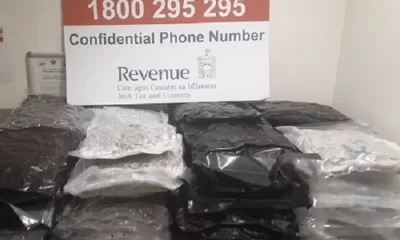Business
Guyana Authorities Seize Weed Shipment from the U.S.

People are gettin’ high all over the world, including the small South American country of Guyana.
People are gettin’ high all over the world, including the small South American country of Guyana.
Customs officials in Guyana last week intercepted and seized a box of cannabis that had been shipped from the United States.
The Customs Anti Narcotic Unit (CANU), the top drug enforcement agency in the South American country, said in an announcement that its officers “were contacted on January 20, 2023, after packages of suspected cannabis were discovered in a box shipped from the United States at the Muneshwar shipping limited.”
“CANU officers arrived on the scene and conducted additional searches before taking possession of the box,” the agency said in the announcement, which was posted on Facebook. “The box was then transported to CANU headquarters in the presence of the employee of the shipping company, who made the discovery. The suspected cannabis tested positive for cannabis and amounted to 1.92 … kgs.”
The Customs Anti Narcotic Unit said that investigations into the package are ongoing.
Despite marijuana’s ubiquity in Guyana’s warm climate, the country’s government takes a hardline against weed, strictly prohibiting its cultivation, sale and possession.

According to the Guyana Standard, the Customs Anti Narcotic Unit “conducted several raids and was able to clear 3,403.68 kilogrammes of narcotics amounting to a street value of $1.1 billion off the streets” last year.
“This represents a 68.26 percent increase in comparison to 2,022.88 kilogrammes of narcotics amounting to $634 million in 2021,” the outlet reported. “There were 24 cases of cocaine, 80 cases of cannabis, four cases of ecstasy, and two cases of methamphetamine in 2022.”
On the same day as the seizure of the cannabis package in Muneshwar, the Customs Anti Narcotic Unit announced that a woman had been “sentenced to four years in prison and fined $53.1 million for cannabis possession by Magistrate Leron Daly after admitting to having 59 kgs of cannabis in her possession for the purpose of trafficking.”
According to the Guyana Standard, the country’s government “has been investing millions of dollars in the security sector to provide a safe and secure environment for Guyanese,” including “purchasing vehicles for the Guyana Police Force (GPF) while training police officers and allocating half a million dollars to the Customs Anti Narcotics Unit (CANU) to advance its work.”
CANU was “established through a Cabinet decision in 1994 and was implemented in August 1995,” according to the law enforcement agency’s official website.
“The Narcotic Drugs and Psychotropic Substances (Control) Act, 1988 was amended in 1999 to facilitate the legal operation of the Unit and to give it the same authority to enforce it, as the Guyana Police Force,” the site explains. “In April 2001, Guyana and the United States signed a Shiprider Agreement to suppress illicit traffic by sea and air. The agreement seeks to reduce the ability of illicit narcotics traffickers to elude maritime law enforcement agencies within and outside the territorial waters of Guyana, as well as to strengthen Guyana’s maritime law enforcement capabilities. On July 23, 2003, the National Assembly passed the Maritime Drug Trafficking (Suppression) Bill 2003. The Bill … provide[d] the legal framework for the implementation of provisions of international, hemispheric, regional and bilateral agreements, of which Guyana is a part. The Agency is also linked to INTERPOL, one of the world’s biggest coordinators of drug interdiction agencies. The Narcotics Unit also plays an active role in the World Customs Organisation. The Government of Guyana and the Government of Colombia signed an agreement that allowed Guyanese law enforcement officers to benefit from anti-narcotics training.”
Source: https://hightimes.com/news/guyana-authorities-seize-weed-shipment-from-the-u-s/
Business
New Mexico cannabis operator fined, loses license for alleged BioTrack fraud

New Mexico regulators fined a cannabis operator nearly $300,000 and revoked its license after the company allegedly created fake reports in the state’s traceability software.
The New Mexico Cannabis Control Division (CCD) accused marijuana manufacturer and retailer Golden Roots of 11 violations, according to Albuquerque Business First.
Golden Roots operates the The Cannabis Revolution Dispensary.
The majority of the violations are related to the Albuquerque company’s improper use of BioTrack, which has been New Mexico’s track-and-trace vendor since 2015.
The CCD alleges Golden Roots reported marijuana production only two months after it had received its vertically integrated license, according to Albuquerque Business First.
Because cannabis takes longer than two months to be cultivated, the CCD was suspicious of the report.
After inspecting the company’s premises, the CCD alleged Golden Roots reported cultivation, transportation and sales in BioTrack but wasn’t able to provide officers who inspected the site evidence that the operator was cultivating cannabis.
In April, the CCD revoked Golden Roots’ license and issued a $10,000 fine, according to the news outlet.
The company requested a hearing, which the regulator scheduled for Sept. 1.
At the hearing, the CCD testified that the company’s dried-cannabis weights in BioTrack were suspicious because they didn’t seem to accurately reflect how much weight marijuana loses as it dries.
Company employees also poorly accounted for why they were making adjustments in the system of up to 24 pounds of cannabis, making comments such as “bad” or “mistake” in the software, Albuquerque Business First reported.
Golden Roots was fined $298,972.05 – the amount regulators allege the company made selling products that weren’t properly accounted for in BioTrack.
The CCD has been cracking down on cannabis operators accused of selling products procured from out-of-state or not grown legally:
- Regulators alleged in August that Albuquerque dispensary Sawmill Sweet Leaf sold out-of-state products and didn’t have a license for extraction.
- Paradise Exotics Distro lost its license in July after regulators alleged the company sold products made in California.
Golden Roots was the first alleged rulebreaker in New Mexico to be asked to pay a large fine.
Source: https://mjbizdaily.com/new-mexico-cannabis-operator-fined-loses-license-for-alleged-biotrack-fraud/
Business
Marijuana companies suing US attorney general in federal prohibition challenge

Four marijuana companies, including a multistate operator, have filed a lawsuit against U.S. Attorney General Merrick Garland in which they allege the federal MJ prohibition under the Controlled Substances Act is no longer constitutional.
According to the complaint, filed Thursday in U.S. District Court in Massachusetts, retailer Canna Provisions, Treevit delivery service CEO Gyasi Sellers, cultivator Wiseacre Farm and MSO Verano Holdings Corp. are all harmed by “the federal government’s unconstitutional ban on cultivating, manufacturing, distributing, or possessing intrastate marijuana.”
Verano is headquartered in Chicago but has operations in Massachusetts; the other three operators are based in Massachusetts.
The lawsuit seeks a ruling that the “Controlled Substances Act is unconstitutional as applied to the intrastate cultivation, manufacture, possession, and distribution of marijuana pursuant to state law.”
The companies want the case to go before the U.S. Supreme Court.
They hired prominent law firm Boies Schiller Flexner to represent them.
The New York-based firm’s principal is David Boies, whose former clients include Microsoft, former presidential candidate Al Gore and Elizabeth Holmes’ disgraced startup Theranos.
Similar challenges to the federal Controlled Substances Act (CSA) have failed.
One such challenge led to a landmark Supreme Court decision in 2005.
In Gonzalez vs. Raich, the highest court in the United States ruled in a 6-3 decision that the commerce clause of the U.S. Constitution gave Congress the power to outlaw marijuana federally, even though state laws allow the cultivation and sale of cannabis.
In the 18 years since that ruling, 23 states and the District of Columbia have legalized adult-use marijuana and the federal government has allowed a multibillion-dollar cannabis industry to thrive.
Since both Congress and the U.S. Department of Justice, currently headed by Garland, have declined to intervene in state-licensed marijuana markets, the key facts that led to the Supreme Court’s 2005 ruling “no longer apply,” Boies said in a statement Thursday.
“The Supreme Court has since made clear that the federal government lacks the authority to regulate purely intrastate commerce,” Boies said.
“Moreover, the facts on which those precedents are based are no longer true.”
Verano President Darren Weiss said in a statement the company is “prepared to bring this case all the way to the Supreme Court in order to align federal law with how Congress has acted for years.”
While the Biden administration’s push to reschedule marijuana would help solve marijuana operators’ federal tax woes, neither rescheduling nor modest Congressional reforms such as the SAFER Banking Act “solve the fundamental issue,” Weiss added.
“The application of the CSA to lawful state-run cannabis business is an unconstitutional overreach on state sovereignty that has led to decades of harm, failed businesses, lost jobs, and unsafe working conditions.”
Business
Alabama to make another attempt Dec. 1 to award medical cannabis licenses

Alabama regulators are targeting Dec. 1 to award the first batch of medical cannabis business licenses after the agency’s first two attempts were scrapped because of scoring errors and litigation.
The first licenses will be awarded to individual cultivators, delivery providers, processors, dispensaries and state testing labs, according to the Alabama Medical Cannabis Commission (AMCC).
Then, on Dec. 12, the AMCC will award licenses for vertically integrated operations, a designation set primarily for multistate operators.
Licenses are expected to be handed out 28 days after they have been awarded, so MMJ production could begin in early January, according to the Alabama Daily News.
That means MMJ products could be available for patients around early March, an AMCC spokesperson told the media outlet.
Regulators initially awarded 21 business licenses in June, only to void them after applicants alleged inconsistencies with how the applications were scored.
Then, in August, the state awarded 24 different licenses – 19 went to June recipients – only to reverse themselves again and scratch those licenses after spurned applicants filed lawsuits.
A state judge dismissed a lawsuit filed by Chicago-based MSO Verano Holdings Corp., but another lawsuit is pending.
Source: https://mjbizdaily.com/alabama-plans-to-award-medical-cannabis-licenses-dec-1/
-

 Business2 years ago
Business2 years agoPot Odor Does Not Justify Probable Cause for Vehicle Searches, Minnesota Court Affirms
-

 Business2 years ago
Business2 years agoNew Mexico cannabis operator fined, loses license for alleged BioTrack fraud
-

 Business2 years ago
Business2 years agoAlabama to make another attempt Dec. 1 to award medical cannabis licenses
-

 Business2 years ago
Business2 years agoWashington State Pays Out $9.4 Million in Refunds Relating to Drug Convictions
-

 Business2 years ago
Business2 years agoMarijuana companies suing US attorney general in federal prohibition challenge
-

 Business2 years ago
Business2 years agoLegal Marijuana Handed A Nothing Burger From NY State
-

 Business2 years ago
Business2 years agoCan Cannabis Help Seasonal Depression
-

 Blogs2 years ago
Blogs2 years agoCannabis Art Is Flourishing On Etsy













